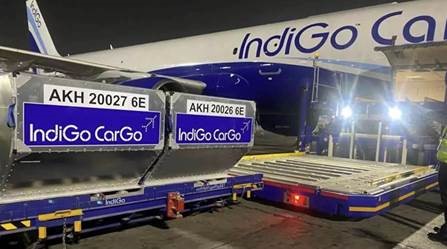엑스트란스 - 항공 물류 업데이트 - 01주차 블로그
항공화물 General
1) 에어부산, 통합 LCC 가속 - 대한항공 출신 경영진 대거 포진

- 지역 거점 항공사 에어부산이 새 대표 취임 8개월 만에 경영진 교체. 새 경영진에 대한항공 임원들이 대거 포진되면서 아시아나항공과 기업 결합에 마침표를 찍은 대한항공이 자회사들을 합친 통합 LCC 출범에 속도를 내는 모양새.
- 29일 금융감독원 전자공시시스템에 따르면 에어부산은 정병섭 대한항공 여객영업부 담당(상무)과 송명익 대한항공 기업결합 TF 총괄팀장(상무)을 사내이사로, 서상훈 대한항공 재무 컨트롤러 담당(상무)을 기타 비상무이사로 선임하기 위해 내달 16일 임시 주주총회를 소집.
- 대표이사에 내정된 정병섭 상무는 대한항공 미 동부 지점장과 스케줄운영부 담당 등을 역임하고 현재 대한항공 여객영업부를 담당. 에어부산은 공시를 통해 “항공사 경영 전반에 대한 충분한 경험과 지식을 갖추고 있어 이사회에서도 회사 경영의 중요사항 심의 결정 등의 직무를 공정하게 수행할 것으로 판단되며 에어부산의 경쟁력 제고에 기여할 것으로 기대된다”고 정 상무의 추천 배경을 설명.
- 송명익 상무는 대한항공 동남아지역본부장 등을 거쳐 현재 대한항공 기업결합 TF 총괄팀장을 맡고 있으며 에어부산 영업본부장에 내정. 에어부산은 송 상무에 대해 “기업결합 TF 총괄팀장으로 추후 에어부산 통합 작업에 큰 기여를 할 것으로 판단한다”고 명시.
- 이처럼 에어부산 새 임원진 구성이 통합에 초점이 맞춰지자 그동안 지역 사회가 줄기차게 요구해 온 에어부산 부산 존치는 더욱 불투명해짐..
- 당초 이달 하순께로 예견됐던 부산시와 대한항공 회장 회동도 대한항공 인사 이동과 구체적인 실무협의를 이유로 내달로 미뤄진 것으로 알려지면서 불안이 가중.
- 지역 사회는 대한항공과 아시아나항공 기업결합 추진 발표 당시 국토교통부 등이 밝힌 통합 LCC 본사 부산 유치에 희망을 걸었으나 이후 기업의 문제라며 정부가 발을 빼자 분리매각으로 가닥을 잡고 에어부산 부산 존치를 꾸준히 요구.
- 최근 시와 부산상공회의소, 시민단체로 구성된 지역 거점 항공사 존치를 위한 총괄 태스크포스(TF)는 독립법인 운영을 새롭게 제안했으며, 일부 시민단체는 분리매각을 지속적으로 요구하는 등 지역 사회의 에어부산 부산 존치 요구는 사그러들지 않고 있음..
2) 韓-베트남 AEO 상호인정약정 – 우리 기업 신속통관 기대

- 앞으로 우리 기업들의 베트남 수출이 더욱 원활해질 전망.
- 관세청은 지난 24일 우리나라의 3대 수출교역국인 베트남과 수출입 안전관리 우수업체(AEO) 상호인정약정(MRA)을 체결했다고 26일 밝힘,
- AE(수출입안전관리우수업체)는 세관당국이 기업의 법규준수도, 물류 안전관리 역량 등을 심사해 우수함을 공인한 기업을 말함.
- AEO MRA는 한 국가에서 공인한 ‘수출입 안전관리 우수업체’를 상대국에서도 공인기업으로 인정해 해당 국가에서 신속통관 등 통관 절차상 혜택을 받도록 하는 관세당국 간 약정. 현재 우리나라는 미국, 일본, 중국 등 24개국과 AEO MRA를 체결 중이며 베트남이 25번째 체결국.
- 양국 간 AEO MRA 체결은 2016년부터 그 논의가 시작됐으나 코로나 팬데믹 등으로 장기간 답보 상태에 머물던 중, 지난해 열린 한-베트남 정상회담을
- 계기로 다시 원만하게 추진될 수 있었음.
- 對 베트남 수출 중 약 57%에 해당하는 303억달러를 AEO 기업들이 담당하고 있는 만큼 이번 한-베 AEO MRA 체결로 우리 기업의 수출경쟁력이 크게 강화될 것으로 기대.
- 특히, 이번 AEO MRA 체결로 우리나라는 10대 수출교역국과 모두 AEO MRA를 체결하는 쾌거를 이룸. .
- 고광효 관세청장은 “베트남은 우리나라의 3대 수출교역국이자 중요한 경제 협력 파트너”라고 강조하면서, “이번 한-베 AEO MRA 체결이 우리 기업의 수출 확대와글로벌 경쟁력 강화에 도움이 되길 희망한다”고 전함.
- 응웬 반 터 베트남 관세총국장은 “이번 AEO MRA 체결을 계기로 양국 간 경제 협력이 더욱 가속화되고 양국 AEO 기업이 새로운 성과를 창출해 나가길바란다”고 밝힘.
- 관세청은 우리 AEO 기업이 이번 한-베 AEO MRA 체결에 따른 통관 혜택을 조속히 받을 수 있도록 AEO MRA 이행을 위한 후속 조치에 속도를 낼 예정. 또한 주요 교역국과 구축해 둔 AEO 공급망을 기반으로 세관 협력을 강화하고 AEO MRA 체결도 지속 확대해 우리 수출기업이 무역하기 좋은 환경을 조성해 나갈 계획.
3) 인도항공화물시장2030년, 연간1,000만톤목표로 성장 전망

- 항공물류 전문매체AIR CARGO WEEK에 따르면 올해 전자상거래 수요급증과 제조업확장으로 성공적인 성과를 거둔 인도 항공화물시장이 내년에도 성장세를 이어갈 전망.
- 글로벌 항공사와 포워더들 모두 인도 항공화물시장의 잠재력에 대해 긍정적인 평가를 내놓고 있으며, 향후 지속적인 성장을 기대하고 있음.
- 인도의 최대 민간항공사인 인디고(IndiGo)는 올해 역대 최고실적을 기록한 바 있으며, 내년에도 시장 성장기회를 극대화 하기위해 다양한 전략을 준비중 임.
- 특히, 인디고는 지난 10월 한달 동안에만 3만7,000톤이상의 화물을 운송하며 새로운 기록을 세웠고, 이러한 상승세가 2025년에도 계속될 것 으로 보고 있음. 이에 따라 인디고는 현재 운용 중인 A321 개조 화물기 3대에 더해 와이드바디 항공기인 A350 도입을추진하고있으며, 글로벌 화물네트워크 확장을 목표로 하고있음.
- 최근 개설된 콜카타와 중국 후베이성 어저우를 연결하는 주 3회 화물기 노선은 이러한 전략이 그 배경임.
- 인도의 항공화물 물동량은 2024-25 회계연도에 전년 대비 9-11% 증가한 약 360만 ~ 370만톤에 이를 것으로 전망됨. 또한, 전자상거래의 급속한 성장에 힘입어 인도는 2030년까지 연간 1,000만톤의 항공화물을 처리하는 것을 목표로 하고 있음.
- 포워더들도 항공사들이 수요증가에 대응하기 위해 효율성과 혁신을 강화하고 있는 점을 들어, 시장에서 충분한 수익성을 유지할 수 있을 것으로 기대하고 있음.
- 특히, 곧 개항 예정인 나비 뭄바이국제공항 (NaviMumbai International Airport)은 인도 항공화물 시장에 새로운 활력을 불어넣을 것으로 보임. 이 신공항은 기존 뭄바이 공항의 혼잡을 해소하고, 물류흐름을 개선할 수 있는 선진 인프라를 제공할 것으로 평가받고 있음.
- 다만, 신선식품 화주들은 높은항공 운임, 냉동 공급망 인프라 부족, 그리고 세관통관 지연 등의 문제로 품질유지에 어려움을 겪고 있음. 이들은 공항 효율성 개선, 세관 절차 간소화, 냉동공급망 강화 등의 대책이 시급하다고 지적하고 있음.
4) Ti 보고서 : 아시아태평양, 2028년까지연평균성장률7.5% 기록 예상

- 지난 2020년 이후 꾸준한 성장을 기록 중인 글로벌 소포 (parcel) 시장은 아시아 태평양지역이 시장을 주도하고 있다고 분석.
- 최근 물류시장 전문조사기관인 Transport Intelligence (Ti)는 글로벌 소포 시장은 2020년부터 현재까지 연평균 성장률(CAGR) 5%를 기록했으며, 2020년시장 규모는 약 4,490억 유로 (4,707억달러)였으며, 전세계적으로 온라인 쇼핑 수요가 폭증한 2021년에는 5,940억 유로로 급증했다고 밝힘.
- 2022년에는성장세가 일시적으로 둔화되었지만, 2023년에는 회복세를 보였고, 올해 2024년에는 5.1% 성장해 5,450억 유로에 이를 것으로 전망됨.
- 이와 같은 성장이 " 전자상거래 활동 증가와 고효율 물류 솔루션에 대한 수요확대 " 에 기인한다고 분석하면서, 그러나 지역별로 성장률에는 뚜렷한 차이가 존재한다고 지적.
- 특히, 아태시장은 가치 기준으로 글로벌 소포시장에서 가장 큰 비중을 차지하며, 올해 지역 특송 및 소포시장은 7.7% 성장할 것으로 예측했으며, 반면 북미와 유럽시장은 각각 3.2%와 3.5%의 성장률에 그칠 것으로 전망함.
- 이에 따라 Ti는 장기 전망을 통해 아태시장은 오는 2028년까지 연평균 성장률 7.5%로 글로벌 소포시장에서 가장 높은 성장률을 기록하며 시장 성장을 주도할 것으로예상.
- 관계자는 “ 아태시장의 지속적인 성장은 전자상거래의 폭발적인 확장과 지역내 배송 기술혁신에 의해 가속화되고있다 " 며, 2024년 약 2,150억 유로 규모였던 시장이 2028년에는 2,880억 유로로 크게 확대될 것으로 내다 봤음.

top



